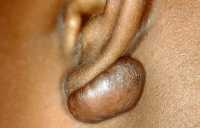MedicalResearch.com Interview with:
Hong Liang Tey MBBS, FRCP
Head of Research Division and Senior Consultant, National Skin Centre, Singapore
Adj Assoc Prof., Yong Loo Ling School of Medicine, National University of Singapore
Asst Prof., Lee Kong Chian School of Medicine, Nanyang Technological University, Singapore
MedicalResearch.com: What is the background for this study?
We developed dissolving microneedles embedded with a medication, triamcinolone, as a novel treatment option for patients with keloids and evaluated its efficacy and safety in a clinical trial.
Background: Keloids are a common skin disorder and itch and pain afflicts up to 80% of patients. The first-line and typically the only treatment option is multiple repeated intra-lesional corticosteroid injections by dermatologists or specially-trained nurses. However, many patients are unable to undergo this treatment. Typically, such patients
- Are unable to tolerate the pain of conventional intra-lesional injection, as keloids are inherently hypersensitive. The problem is exacerbated by the fact that repeated monthly injections are required to achieve a response. In addition, children cannot tolerate pain and cannot undergo such injections.
- Have keloids on the mid facial region, where injection carries a risk of causing blindness.
- Are unable to afford the time and cost of repeated travelling to see a dermatology doctor or nurse for the injections. These include patients residing or working overseas.
- Have mid-sternum protrusive scars after cardiac arterial bypass surgery, and painful injections may trigger another heart attack.

